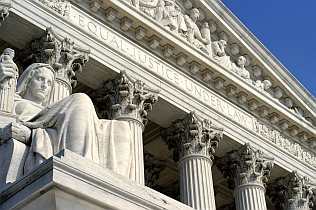Court records out and about
The Legal Genealogist had a lot of fun last night speaking to a great group of engaged genealogists at the Historical Society of Pennsylvania in Philadelphia.
 It’s a fabulous repository, and one that holds a truly mid-boggling array of information about folks not just from the City of Brotherly Love but from all over — one of the earliest holdings of the HSP dates back to the Italian Renaissance and bears the original signature of Lorenzo de Medici dated 1479. So it’s well worth a visit for any genealogist.1
It’s a fabulous repository, and one that holds a truly mid-boggling array of information about folks not just from the City of Brotherly Love but from all over — one of the earliest holdings of the HSP dates back to the Italian Renaissance and bears the original signature of Lorenzo de Medici dated 1479. So it’s well worth a visit for any genealogist.1
We got to talk about private laws and all those rogues and rascals in our family trees and, as often happens, someone had the question.
“If I know my ancestor was in federal court,” the question runs, “where will I find the records today?”
And the answer is not quite so easy.
Yes, there is no doubt that any records that remain of federal court cases should be held by the National Archives.
The problem is… which National Archives?
Here’s the deal. There are three major record groups at the National Archives that hold the records of the United States courts:
• Record Group 267 holds the Records of the Supreme Court of the United States, ranging from very early cases of appeals from state courts of ship prize cases from the Revolutionary War all the way up to more modern Supreme Court case files.2
• Record Group 276 holds the Records of the United States Courts of Appeals, the intermediate appellate court — the one court to which everyone has a right to appeal.3
• Record Group 21 holds the Records of District Courts of the United States — the basic trial-level court records from around the United States from the earliest days up to the latest ones that aren’t still being held by the courts for their own use.4
Now it’s relatively easy to figure out where to find the Supreme Court records in RG 267: some of these materials are on microfilm (see Microfilm Publications M162, M214, M215, M216, M217, M408, and T57), a few are at Archives II in College Park, Maryland, but the vast majority are textual records held at Archives I in downtown Washington, D.C.
But for the other two big record groups? Oy… Not so easy. Because the records are held at regional NARA repositories around the United States. And to get to the records, you need to get to the right regional NARA branch. So here’s a cheat sheet:
Federal Trial Courts
| NARA Facility | Federal Trial Court Records from: |
| Atlanta | Alabama; Florida; Georgia; Kentucky; Mississippi; North Carolina; Puerto Rico (some); South Carolina; Tennessee |
| Boston | Connecticut; Maine; Massachusetts; New Hampshire; Rhode Island; Vermont |
| Chicago | Illinois; Indiana; Michigan; Minnesota (some); Ohio; Wisconsin |
| Denver | Colorado; New Mexico; Utah; Wyoming |
| Fort Worth | Arkansas; Louisiana; Oklahoma; Texas |
| Kansas City | Iowa; Kansas; Minnesota (some); Missouri; Nebraska; North Dakota; South Dakota |
| Los Angeles | Arizona; California (Central); California (Southern District); Nevada (Las Vegas) |
| New York | New Jersey; New York; Puerto Rico (some) |
| Philadelphia | Delaware; Maryland; Pennsylvania; Virginia; West Virginia |
| San Francisco | American Samoa, California (Eastern); California (Northern); California (Southern Circuit); Guam; Hawaii; Nevada (Reno and all naturalizations); Trust Territory of Pacific Islands |
| Seattle | Alaska; Idaho; Montana; Oregon; Washington |
Federal Courts of Appeals
| NARA Facility | Federal Appeals Court Records from: |
| Boston | U.S. Court of Appeals for the First Circuit |
| New York | U.S. Court of Appeals for the Second Circuit |
| Philadelphia | U.S. Court of Appeals for the Third Circuit |
| Philadelphia | U.S. Court of Appeals for the Fourth Circuit |
| Fort Worth | U.S. Court of Appeals for the Fifth Circuit |
| Chicago | U.S. Court of Appeals for the Sixth Circuit |
| Chicago | U.S. Court of Appeals for the Seventh Circuit |
| Kansas City | U.S. Court of Appeals for the Eighth Circuit |
| San Francisco | U.S. Court of Appeals for the Ninth Circuit |
| Denver | U.S. Court of Appeals for the Tenth Circuit |
| Atlanta | U.S. Court of Appeals for the Eleventh Circuit |
| Archives I | U.S. Court of Appeals for the District of Columbia |
We’ll leave for another day the fact that there are other record groups with court records, too. Like Record Group 116, with the records of the Administrative Office of the U.S. Courts, and Record Group 123, with the records of the U.S. Court of Claims, and Record Group 172, with the records of the U.S. Commerce Court, and…
Just the basic trial and appellate courts will be enough to get you started…
SOURCES
- See Judy G. Russell, “HSP: research outside the box,” The Legal Genealogist, posted 19 Mar 2015 (https://www.legalgenealogist.com/blog : accessed 7 Oct 2015). ↩
- See generally “Records of the Supreme Court of the United States,” Guide to Federal Records in the National Archives of the United States, web version, Archives.gov (http://www.archives.gov/ : accessed 7 Oct 2015). ↩
- See generally ibid., “Records of the United States Courts of Appeals.” ↩
- See generally ibid., “Records of District Courts of the United States.” ↩


